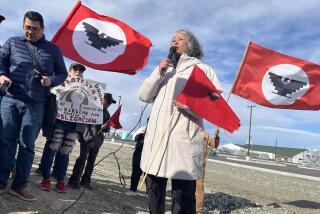It’s Time to Ease Ban on Visits to U.S. by Soviet Unionists
- Share via
Several major American unions, politically moderate, are trying to host a small delegation of Soviet trade unionists next month. If they could talk with the Soviets, they probably would argue strongly over some matters--and just maybe find a few areas of agreement.
However, unless there is a radical policy change by the U.S. State Department, those potentially useful meetings between Soviet and American unionists proposed for Washington, Detroit and New York will not be held.
And the chances of a U.S. policy change are pretty much zilch. That’s not because of objections from right-wing extremists but because the AFL-CIO continues to adamantly demand rigid enforcement of the ban against unionists coming to this country from any Soviet Bloc nation.
Rock and classical musicians, dancers, scientists, doctors, business executives, educators, politicians and even President Reagan exchange visits with their counterparts in the Soviet bloc nations.
America’s “don’t-let-them-in” policy applies only to unionists.
As insular as that State Department policy is, the AFL-CIO goes one better--or, rather, worse.
Not only does the labor federation’s official policy call for exclusion of Soviet Bloc union leaders from this country, it also prohibits AFL-CIO officials from having any contact with Soviet unionists. The AFL-CIO also urges other U.S. union leaders to follow the same policy.
The decades-old no-contact policy of the federation was unequivocally reiterated recently. It came in a letter from AFL-CIO President Lane Kirkland in response to a request for a new explanation of the policy from several state and local AFL-CIO officials.
The State Department refuses to issue visas to representatives of unions from the Soviet Union or other Communist Bloc countries on the grounds that they are from government-controlled unions and therefore not legitimate representatives of workers. But the State Department puts full responsibility for the exclusion policy on the AFL-CIO. An official of the department’s visa services, Charles L. Stephan, explained it this way in a letter to William Winpisinger, president of the International Assn. of Machinists:
“The legislation granting the department authority to deny visa waivers to government labor officials who are instruments of totalitarian communist states results from representations made by the AFL-CIO, which has taken a continuous interest in urging the United States government not to grant visa waivers in these cases.”
These days, leaders of every kind of Soviet Bloc institution and organization except unions are coming to the United States in increasing numbers. And they are as much under their governments’ thumbs as the union leaders are.
They are all expected to follow the Communist Party line if they travel outside their country.
The latest effort to exchange visits with Soviet Bloc unionists logically should have some chance of success in this time of Soviet glasnost and efforts by Soviet leader Mikhail S. Gorbachev and President Reagan to achieve a new detente.
But there is little hope for logic in the U.S. decision on the latest visa applications from officials of Soviet unions, complains Robert Kalaski, editor of the Machinist, the newspaper published by the International Assn. of Machinists.
“There is nothing subversive or mysterious about our invitation to six Soviet journalists to meet with us in this country,” says Kalaski.
“Editors of several American union papers visited Russia in 1985. It was a useful trip. Not unnaturally, we asked the Soviet journalists to pay us an exchange visit. They tried then but were denied visas by our own government, and they were kept out again when we extended another invitation in 1986.
“We don’t really expect any better judgment will be used by the State Department this time. But at least we can hope.”
The Machinists’ union and other American unions have tried many times without success to have an exchange of visits with leaders of Soviet unions.
But the federation’s unswerving stand against such exchanges was explained in a special, exhaustive AFL-CIO report that accompanied Kirkland’s latest letter on the subject.
The report warns American unions to beware of, among other things, “fresh appeals (from the Soviets) for contacts and cooperation with democratic trade union organizations.
“There is no evidence that the state-run ‘trade unions’ of the Soviet Union and its allies are anything but agents for the control of workers by the Communist Party,” according to the report.
The Communists, the AFL-CIO report argues, have used an organization called the World Federation of Trade Unions since the early 1940s “in an appeal for international ‘worker unity.’ ”
But the report contends the true purpose of the WFTU “is, as ever, to weaken the resolve of democratic trade unionists in maintaining a separate and distinct (non-Communist) course.”
The Soviet Bloc unions are increasing efforts to make contacts with unions in the West to make more plausible their claim that they are legitimate representative of workers, the report says.
That completely ignores what advantage there might be in the sort of East-West contacts that are being encouraged by so many other American anti-communist organizations.
Maybe, the AFL-CIO concedes, significant structural changes will come soon to the Soviet Bloc, giving workers a “real voice in determining the conditions of their lives.” But the report insists that policies cannot be based on Soviet “declarations of intent.”
Despite the labor federation’s policy, many AFL-CIO affiliated unions ignore the federation’s no-contact policy and visit Soviet Bloc countries even though they cannot arrange exchange visits.
Perhaps more significantly, the policy is also opposed by the International Confederation of Free Trade Unions, which was created by non-Communist unions in the United States and elsewhere specifically to counter the Communist-dominated WFTU.
The non-communist organization, in which the AFL-CIO is a key player, recently adopted a resolution saying there should be increased contact between unions of all countries, including those in the Soviet bloc.
The non-communist ICFTU rejected the AFL-CIO position, saying such contacts between unions are needed to further the “credible process of building genuine detente . . . between East and West. “
Unfortunately, leaders of the Communist-dominated WFTU do say some stupid things that hurt efforts by moderate U.S. unions to relax the AFL-CIO’s hard-line policy.
For instance, in a recent interview in New York, WFTU general secretary Ibraham Zakaria voiced strong support for the union created by the Polish government to help smash Solidarity, the outlawed Polish union led by Lech Walesa, who won the Nobel peace prize in 1983 for his leadership of the movement.
Not only do all non-Communist unions oppose the Polish government’s puppet union, even the Communist-dominated unions are divided on the issue, as they are on other matters.
The unyielding stand of the present AFL-CIO leadership hasn’t changed since Matthew Woll, a vice president of the old American Federation of Labor, wrote in 1948:
“One fact deeply lodged in AFL experience is that destruction follows every attempt to cooperate with or even live alongside Communists.”
The new AFL-CIO report shows what might be a slight softening of that position.
It says that democratic unions may have policies that at times coincide with those of unions in the Soviet Bloc and still not be suspected of collaboration with communism.
But it is time for the AFL-CIO to go further than that.
It should join its growing number of affiliates and the International Confederation of Free Trade Unions in calling for the United States to, at last, allow Soviet Bloc unionists to visit this country as freely as representatives of any other organization in Communist countries.
More to Read
Inside the business of entertainment
The Wide Shot brings you news, analysis and insights on everything from streaming wars to production — and what it all means for the future.
You may occasionally receive promotional content from the Los Angeles Times.










